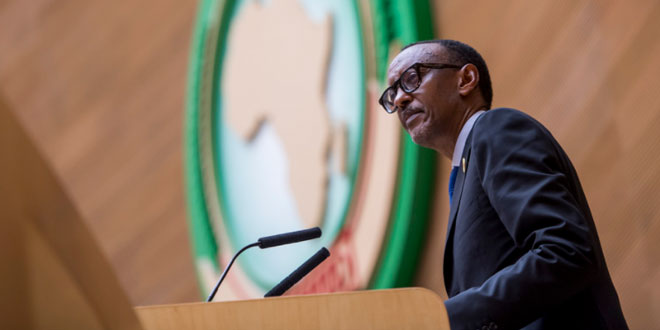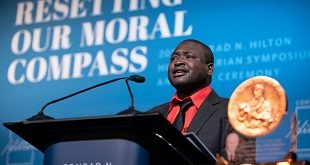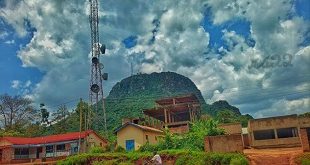
Why she chose to base book on interviews with Kagame’s enemies but not give his side
THE LAST WORD | ANDREW M. MWENDA | The fundamental error of Michela Wrong’s book was to listen to one side in the Rwandan story. Consequently, she ended up sanctifying Patrick Karegyeya and other opposition individuals and groups and demonising President Paul Kagame and his government. For instance,
when RPF took over power in 1994, the state had totally collapsed, the economy had been completely destroyed and the society had been systematically torn asunder. Yet anyone who visits Rwanda today would be profoundly impressed by the speed, scale and scope of its state reconfiguration, economic reconstruction and social reconstitution.
How did this happen? Is it not obvious that it is the decisions and actions Kagame and those around him took that have made this possible?
No one in 1994 thought it was possible to reconfigure the state in Rwanda, reconstruct its economy and to reconstitute that society so that both Hutu and Tutsi can live peacefully. If Wrong was not a partisan doing a hatchet job on Kagame, she would have wondered: could the high-handed measures employed by the post genocide government been the ones responsible for this dramatic and indeed miraculous transformation?
One of her main accusations against RPF was that it too indulged in massacres – of ethnic Hutu. No one in RPF denies that there were revenge killings in Rwanda between 1994 and 1998. In the heat of the genocide, the RPF did execute many of its own soldiers who killed civilians. Yet it is possible many killings of civilians could have taken place between 1994 and 2,000 by errant individual soldiers (revenge killings) or even on the orders of RPF officers (isolated but systematic) which may have not been punished. But that is the complexity of the post genocide Rwandan story: vast numbers of Hutus who actively committed genocide were forgiven in the name of reconciliation and healing. Does it not follow that not every killing by the Tutsis could not go unpunished? Is Wrong saying that Hutu killers could be forgiven but not Tutsi ones? Is that fair?
In fighting Adolf Hitler, the Western allies made mistakes, like the bombing of Dresden. Six million innocent German civilians lost their lives. But would Wrong write a book on the post-World War Two that creates some moral equivalence between the crimes of Hitler and his NAZIs and the allies? This is the critical issue in her book as it tries to present “evidence” that RPF was not different from the genocidal regime it defeated. She presents actions of errant individuals as organised and officially sanctioned killings i.e. counter genocide. I and many Rwandan friends, Tutsi as well as Hutu, found it profoundly repulsive.
Let us return to Karegyeya, the hero of her book. I knew him very well. We were good friends. It is actually he that introduced me to Kagame in 2001. When he was fired, I remained his friend. I used to visit him and his wife at their home when many Rwandans were avoiding them. On many occasions I warned him of the dangers of a former chief of intelligence speaking loosely in bars, continuing to meet his assets, both domestic and international, without seeking permission from the system. But I realised that Karegyeya found it hard to adjust to private life, to be an ordinary citizen. This led him to develop a hostile attitude towards the government. His words and actions came to border on subversion.
Wrong inadvertently reveals the petty but equally dangerous aspects of Karegyeya. She tells of how he walked into the British High Commission offices in Kampala and casually told some low-level official that he was the main player in the shooting down of the plane of former President Juvenal Habyarimana and his Burundian counterpart. Even if this were true, what kind of former intelligence chief is this? States do many dirty things and their intelligence officials hold many secrets. Imagine a former director of the CIA or Mossad or MI6 walking into the embassy of Russia and revealing their operations! What do intelligence agencies do to such agents who turn rogue? Wrong knows.
For me the behavior of Karegyeya, Kayumba Nyamwasa, Theogene Rudasingwa, David Himbara and others only demonstrates the crisis of political elite in Africa. When they fall out of favour, they do not distinguish between state interests and their own grievances.
 The Independent Uganda: You get the Truth we Pay the Price
The Independent Uganda: You get the Truth we Pay the Price




Whereas, it’s true that Rwandan economy has arguably significantly improved during the post-genocide era under President Paul Kagame’s leadership, it doesn’t wash away RPF’s culpability in sparking the 1994, slaughter of the more than 800 000 both Hutu and Tutsi!
Mr Andrew Mujuni we’ve all had the opportunity to interact with both Hutu and Tutsi who fled Rwanda during and after 1994 genocide into all neighbouring states but none exonerates either!
Your last paragraphs are of great interest. You’re at pains to acknowledge the fact that RPF’s role ignited genocide when Karegyeya reveals that actually RPF assassinated president Juvenal Habyarimana!
Very ridiculous when you argue that whereas RPF’s mistakes are of particular individual errors, those committed by Habyarimana’s govt were institutional, i.e written in the constitution that certain tribes can lawfully be eliminated!
Again you don’t tell the reader why Patrick Karegyeya and company disagreed with President Paul Kagame on whether due to fundamental public policy differences or just individual personal interests? Instead you hastily condemn them for not preserving the so-called interests of the state! As if you’re not aware that Africa’s strongmen regard themselves as the state!
So, your scorecard in as far as critiquing Ms Michela Wrong’s book is 3/10!
IT IS EASY TO PLUNDER A NATION, CREATE CHAOS AND FAKE REBELLIONS in it, BUY OUT CORRUPT ELITE AND EXPLOIT AND ENGAGE IN ILLICIT AND ILLEGAL EXPLOITATION OF ITS RESSOURCES, AND BUILD OR RECONSTRUCT A ROMANIAN CEACESCU POST WAR KIND OF SOCIETY , BUY MEDIA AND SOCIAL MEDIA AND CLAIM AND KEEP CLAIMING MIRACLE RECOVERY. and bla bla bla bla.
Your case is well put. Now who is paying for this hatchet job?
Probably we the readers.
I paid US$25.00 for the book (got a discount because I was among the first people to buy it, otherwise I would have paid US$32.00).
Hmm, kyokka Andrew Mwenda!
Mbu, “could the high-handed measures employed by the post genocide government been the ones responsible for this dramatic and indeed miraculous transformation?”
Yes, Andrew, tyrants can bring about amazing transformations in the short term. Stalin did; he transformed a heap of WW2 rubble into a world power in no time. Hitler did; he and built a fantastic war machine inside a decade. Our won Shaka Zulu did. Yes, tyrants CAN perform economic “miracles” sir!
You say “Does it not follow that not every killing by the Tutsis could not go unpunished? Is Wrong saying that Hutu killers could be forgiven but not Tutsi ones? Is that fair?”
But, Andrew, you (conveniently?) forget that the Hutu genocidaires who were forgiven had to go through a cleansing process of confessing and accepting responsibility for their crimes. No such thing has happened with the RPF “avengers”. Killed Hutus? What Hutus? According to the prevailing official political mood, to say that Hutu people were killed in the revenge blood-letting is to “deny the [Tutsi] genocide”. “Is that fair?” you ask? You are comparing apples and oranges!
You seem to know these people well; may be you are too close to maintain focus.
For someone on Kagame’s payroll what else would you say. Wrong is right
Do not Disturb’ was a hatchet job.” An extreme of it’s kind, a bad one, one sided story and extremely lacking in facts or cross checking. I know the stereo types and prejudice and the negative representation of Africa by western journalists and some scholars, but Wrong’s work in her ‘Do boy Disturb’ went into the extremes. Kagame is a ‘dictator’ and kind who even closes country boarders when he has a disagreement with a president of a neighbouring country. However, Wrong’s Do Not Disturb is too far fetched, it fell far short of minimum standards and one of the most uncritical book I have ever read. It was a poor job. Above all, it shows how the West thinks and approaches anything about Africa.
Is it likely- like wrong provides in the intro and many other areas- that Mwenda was another naive and presumptuous intruder on a game only insiders understood when he says he tried to sort out a fallout between erstwhile friends? Is it likely that Karegeya was the intractable one when the well meaning president extended an olive branch, like Mwenda surmises? I’m inclined to believe Wrong here that the subterfuge in Rwanda is so thick even for our resident expert on Rwanda
Karegeya was my friend….. I used to visit him and his wife when everyone avoided him…… when he was sacked, we remained friends….Mweand writes. Mwenda, if this is what you write about someone you claim was your friend; then you have a very big problem. Whoever out there who thinks Mwemda is his/her friend, listen to me, please run and run away from Mwenda very fast because Mwenda can chop off your head at any any given opportunity, especially to make money.
I dont understand. Michaela Wrong, jane Corbin and judi rever are writing, uncovering untold truth today, 29 years after happening of the said events and they say their versions are truthful. Where is Fergal Keane who was on the ground in 1994?, where is Mark Doyle who was present in 1994? Gen. Romeo Dallaire who interacted and spoke with actors in real time? these men have written on the events of those days. But to these three women, all these are fraud. The truth can be told by them after interviewing disgruntled dissidents.
Mwenda has a point. Michela Wrong was angry, biased, bitter and full of hate when she set out to write the book. she gets away with defamation of highest degree because she is white, writing about an african country. the main media publish reviews without fear of being sued, it is about an african cannibal. they also reject counter-opinion about this work from african journalists such as Mwenda, because they dont want to challenge the narrative. I would appreciate if Wrong wrote a book about:
1. Afghanistan
2. Iraq
3. Imperial actions in Kenya and elsewhere.
To say the least Andrew Mwenda is a soulless moral agnostic. Whereby the good includes never distinguishing good from evil, right from wrong. No wonder he told Ugandans that Corruption and Land grabbing are economic and social virtue. And good because his sister Muhanga had grabbed UBC land inn Bugolobi at the price of Shs.10 billion out of the sale of a few goats and contributions from relatives and friends.
Which means, by for example Gen Tibuhaburwa sponsoring the RPA to invade Rwanda in 1990; and remotely pushed the hands of the 1994 genocide, was functionally a good thing. A good thing because, the demise of close to a million lives, created enough room in the over populated Rwanda for people like Patrick Karegyeya Kagame who were stateless and landless in the diaspora.
I was privileged to have read Mwenda’s part 1 of this series. At that time I had not yet read Wrong’s ‘Do Not Disturb’ book. I’m a huge fan of Mwenda (and still are) but some basic honesty is required here: All Mwenda’s reviews from part 1 to part 3 ring so hollow after one has read the book.
Secondly, Wrong’s book is good for intellectual discourse in Rwanda specifically and Africa generally. In other words, Africans need to read many more of such books about their leaders and country. Authors can come from any part of the globe.
HEPK and the RPF government has done lots for Rwanda, lots! However, HEPK’s administration needs Wrong’s book (and others like it) as flavor or seasoning if you like. That’s a major way in which the ‘meal’ prepared by HEPK and co. can be enjoyed by many even beyond Africa. The taste of the pudding is in the eating – critically not in the preparation or the serving. This book, in my view, is very well written. A monumental piece of investigative journalism.
Thirdly, I have come to realize that most commentators against Wrong’s book have no idea that she’s already written separate investigative books on DRC (Following in the Footsteps of Mr Kurtz), Kenya (It’s Our Turn To Eat) and Eritrea (I Didn’t Do It For You).
That background reading provides grounding for perspective and reception of the subject matter.
Thanks for the explanation you have given concerning the reckless documentation of non facts by Miss Wrong.